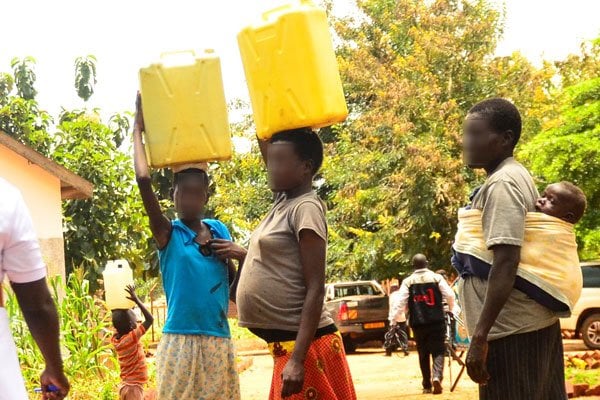Prime
Worry as project workers impregnate, dump 30 girls

Girls and women who claim they were impregnated and abandoned by workers of Nyamughasana Hydro Power Project in Kyarumba Sub-county in Kasese district gather for a meeting at the sub-county headquarters last week. Inset is residents passing near the pipes of the power plant, which was completed in 2022. PHOTO | YOWERI KAGUTA
What you need to know:
- The contractor says it carried out mass campaigns on HIV/Aids and contraceptives before starting the project in Kasese.
Kasese District leaders have raised a red flag upon discovering that more than 30 girls and women were impregnated and subsequently abandoned by alleged former employees of Nyamughasana Hydro-Power Project.
The project, whose construction commenced in 2017 and was completed in 2022, supplies electricity to the national grid in Uganda and was constructed by Frontier Energy.
However, the aftermath tells a different story—one of shattered dreams, violated trust, and the painful plight of those left behind.
Mr Ivan Bwambale Bibuwa, the chairperson for Kyarumba Town Council, told Daily Monitor in a recent interview that they received numerous complaints from parents regarding their children being impregnated in 2021 and consequently, he initiated investigations into the complaints.
“There was a lot of activity in the area, and we had high expectations that the local economy would thrive, and indeed it thrived. However, the results are now miserable because 31 girls and women are stranded with fatherless children,” he said.
Several women and girls told this publication that they were persuaded to engage in sexual activities by men, mostly casual labourers, who were working at the construction site.
However, the workers-turned-fathers, hailing from various parts of Uganda, have all departed the area and are currently unreachable by the families and mothers of their children following the completion of the project.
Ms Juliet Kabugho, who was 17 when she conceived, disclosed that one of the workers, whose name she doesn’t know, approached her, persuading her and providing money, before engaging in a sexual relationship.
“One day, I started receiving several calls from a man who asked me to meet him. After we met, he told me he was working there, and within two weeks, he began sending me money. Initially, it was Shs20,000, then Shs30,000. Subsequently, he insisted that we have sex. Despite my attempts to reject him, he persisted,” she said.
Ms Kabugho added: “When I told him I was pregnant, he immediately refused to believe it. Instead, he demanded that we have sex again. Fearing he wouldn’t take responsibility for the child, I agreed. Afterward, I tried calling him several times, but he just told me it wasn’t his child and that I should get an abortion, which I rejected.”
Ms Jovia Biira, shared a similar story, saying she was approached by an employee of the project while selling tomatoes at the local market in Kasese. She said the man began giving her money, and became pregnant during the course of their relationship.
However, she said he cut off all communication by switching off his mobile phones, a situation that persists to date.
Ms Biira, now 24 and a mother of two, explained that she already had a child with another man before she got involved with the power project worker.
She accused her family members of chasing her from her ancestral home in Kyarumba Town Council following the demise of her parents and is now renting in Kyondo .
“I regret the day I met that man because my family members have since denied me access to our home, and they are telling me they don’t want my child because they don’t know his father,” Ms Biira said.
Mr Bwambale revealed that out of the 31 impregnated women and girls, 14 were underage. He also claimed that some had contracted HIV/Aids.
“Some of these girls were as young as 15 and 16 years, and four of them have testified that they have been diagnosed with HIV,” he said.
Asked if the matter had been reported to the contractors, Mr Bwambale explained that the company, Frontier Energy, was informed in 2021, but no action had been taken.
“I moved around and investigated the issue, wrote a detailed report describing the situation and what each girl was going through. I submitted the report to Frontier Energy, but I never heard from them,” he said.
Company responds
In a November 27, 2023 email to this publication late last month, Frontier Energy outlined measures implemented during the construction of the hydroelectric power plants to prevent the experiences of the 31 affected single mothers.
Mr Anders Hauch, the investment director, explained in an email response to our reporter that the company organised awareness campaigns on HIV/Aids, as well as contraception, for both the local community and employees of the construction companies.
He, however, said despite challenges posed by the pandemic, the company ensured that contractors provided free condoms to their employees as part of the preventive measures implemented during the project.
“Our work with awareness campaigns and dialogue with the local community was hampered by the very restrictive Covid-19 measures in Uganda for most of 2020 and 2021,” Mr Hauch said.
Meanwhile, at Kyarumba Health Centre III, near the construction site, Ms Beatrice Biira, a midwife, said she worked with several girls, most of whom under 15 years, and women who accused Nyamughasana Hydropower project employees of impregnating them.
“It could be true because as a midwife, I worked on them, especially whenever they could come here for antenatal care. Others tested HIV-positive. The biggest number delivered from here, but they could hardly tell us the next of kin of their children because they were claiming they don’t know the whereabouts of their husbands,” she said.
She urged the Ministry of Minerals and Energy to assist the local government in tracing the company’s employees who may have violated the rights of the affected girls and women.
Ms Jane Mbambu,56, said her two daughters, aged 17 and 19 at the time, were impregnated by the power project workers while still in school. She said both girls dropped out of school after they got pregnant.
Ms Mbambu, now the breadwinner of her household after the disappearance of the workers post-construction, expressed the challenges she faces in caring for her grandchildren.
“I am a widow, having lost my husband five years ago. Taking care of my five children and grandchildren is challenging. I vividly remember spending three sleepless nights at Kagando Hospital attending to my daughters during childbirth. I had to bear the financial burden of food and medical bills,” Ms Mbambu said.
Mr Johncation Muhindo, the team leader at Creations Forum Afrika, a human rights defender organisation in Kasese Town, raised concerns about the company handing over the project without addressing the issues of locals.
The Kasese District Chairperson, Mr Eliphaz Muhindi, however, said no official complaints had been received.
“We initially heard them as rumours. But through our networks, especially the community development officers, we have tasked them to investigate these reports and identify the individuals involved,” he said.
Mr Muhindi added: As district leaders, we are going to set conditions for companies, making them responsible for any crimes committed by their workers.”
The State minister of ICT and National Guidance, Mr Godfrey Kabyanga, expressed regret over the incident, and stressed the importance of educating communities about potential risks whenever there are projects in their areas.
The Acting Rwenzori East Regional Police Spokesperson, SP Luke Mbusa, said: “Nobody came to our office to complain.” He, however, urged affected families to come forward, assuring them that the police would address their concerns.
Mr Mbusa announced that his office would initiate a general inquiry file into the matter to investigate the claims.




